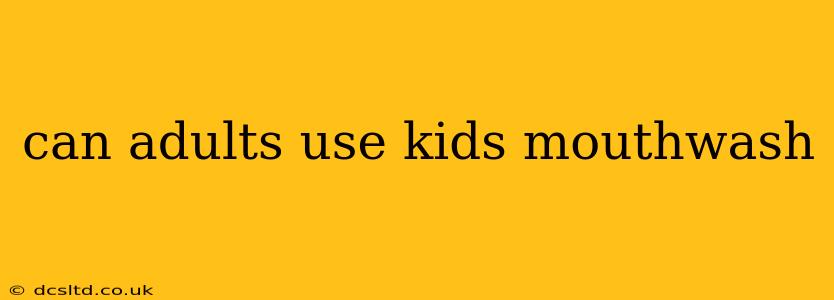Can Adults Use Kids' Mouthwash? A Comprehensive Guide
Many adults wonder if they can use children's mouthwash. The short answer is: generally, no, it's not recommended. While it might seem harmless, using children's mouthwash as an adult could be ineffective and even potentially harmful. This article delves into the reasons why, addressing common concerns and misconceptions.
Why Shouldn't Adults Use Kids' Mouthwash?
Children's mouthwash is formulated differently from adult mouthwash. The key differences lie in the concentration of active ingredients and the overall formulation.
-
Lower Concentration of Active Ingredients: Children's mouthwashes typically contain lower concentrations of fluoride and other active ingredients designed to fight cavities and gingivitis. These lower concentrations are suitable for children's developing teeth and gums, but they are insufficient for the needs of an adult's oral health. Using a children's mouthwash won't provide the same level of protection against plaque, bacteria, and gum disease.
-
Different Flavor Profiles: Children's mouthwashes often have sweeter, fruitier flavors to make them more palatable for young children. While these flavors might be appealing to some adults, relying on them could lead to increased sugar consumption, potentially counteracting the benefits of oral hygiene.
-
Potential for Ineffective Cleaning: Due to the lower concentration of active ingredients, a children's mouthwash might not effectively remove plaque and bacteria from adult teeth and gums. This could lead to an increased risk of cavities, gum disease, and other oral health problems.
What are the Potential Risks of Using Children's Mouthwash as an Adult?
While the risks are usually minimal, there are some potential downsides:
-
Insufficient Protection Against Oral Diseases: As mentioned above, the lower concentration of active ingredients won't provide adequate protection against common oral health issues.
-
Development of Resistance: Over time, relying on a weaker solution might lead to the development of bacterial resistance, making it harder to treat oral infections in the future.
-
Unmet Oral Hygiene Needs: Adults typically have more complex oral health needs, requiring stronger solutions to effectively address plaque, gingivitis, and other concerns.
What About Mouthwash for Specific Needs? (e.g., Sensitive Teeth)
Some adults might be tempted to use children's mouthwash if they have sensitive teeth. However, even in this case, it is better to consult a dentist or hygienist. They can recommend a mouthwash specifically formulated for sensitive teeth that's appropriate for adults, balancing effective cleaning with gentleness.
What Kind of Mouthwash Should Adults Use?
Adults should choose a mouthwash formulated for their age group and specific needs. Options include:
-
Therapeutic Mouthwashes: These contain higher concentrations of active ingredients to effectively combat plaque and bacteria.
-
Mouthwashes for Sensitive Teeth: These are formulated to be gentle on sensitive teeth and gums while still providing effective cleaning.
-
Mouthwashes for Specific Conditions: Some mouthwashes target specific conditions like gingivitis or dry mouth.
Always consult your dentist or hygienist to determine the best type of mouthwash for your individual needs. They can provide personalized recommendations based on your oral health and any specific conditions you may have.
Is it safe for children to use adult mouthwash?
No, it is absolutely not safe for children to use adult mouthwash. The higher concentration of fluoride and other active ingredients can be toxic to young children if ingested. Always use mouthwash that is specifically formulated for children.
Are there any alternatives to traditional mouthwash?
Yes, there are several alternatives to traditional mouthwash, including:
-
Oil pulling: This involves swishing oil in your mouth to remove bacteria.
-
Saltwater rinses: A simple and effective way to soothe irritated gums and remove food particles.
-
Herbal mouthwashes: Some herbal mouthwashes contain natural ingredients that can promote oral health.
However, it's crucial to discuss these alternatives with your dentist before replacing traditional mouthwash, ensuring they meet your specific needs. These alternatives might not provide the same level of protection as a properly formulated adult mouthwash.
In conclusion, while the temptation to use a readily available children's mouthwash might seem logical, it's crucial to prioritize proper oral hygiene with products specifically formulated for adult needs. Consulting a dentist or hygienist is the best way to ensure you're using the right mouthwash for optimal oral health.
